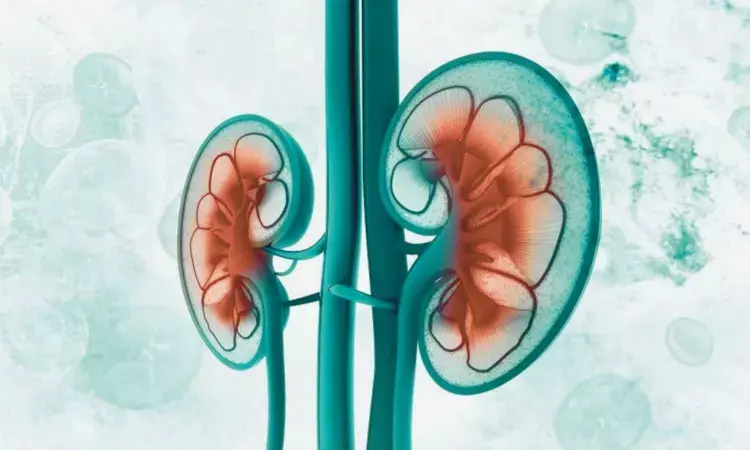- Home
- Medical news & Guidelines
- Anesthesiology
- Cardiology and CTVS
- Critical Care
- Dentistry
- Dermatology
- Diabetes and Endocrinology
- ENT
- Gastroenterology
- Medicine
- Nephrology
- Neurology
- Obstretics-Gynaecology
- Oncology
- Ophthalmology
- Orthopaedics
- Pediatrics-Neonatology
- Psychiatry
- Pulmonology
- Radiology
- Surgery
- Urology
- Laboratory Medicine
- Diet
- Nursing
- Paramedical
- Physiotherapy
- Health news
- Fact Check
- Bone Health Fact Check
- Brain Health Fact Check
- Cancer Related Fact Check
- Child Care Fact Check
- Dental and oral health fact check
- Diabetes and metabolic health fact check
- Diet and Nutrition Fact Check
- Eye and ENT Care Fact Check
- Fitness fact check
- Gut health fact check
- Heart health fact check
- Kidney health fact check
- Medical education fact check
- Men's health fact check
- Respiratory fact check
- Skin and hair care fact check
- Vaccine and Immunization fact check
- Women's health fact check
- AYUSH
- State News
- Andaman and Nicobar Islands
- Andhra Pradesh
- Arunachal Pradesh
- Assam
- Bihar
- Chandigarh
- Chattisgarh
- Dadra and Nagar Haveli
- Daman and Diu
- Delhi
- Goa
- Gujarat
- Haryana
- Himachal Pradesh
- Jammu & Kashmir
- Jharkhand
- Karnataka
- Kerala
- Ladakh
- Lakshadweep
- Madhya Pradesh
- Maharashtra
- Manipur
- Meghalaya
- Mizoram
- Nagaland
- Odisha
- Puducherry
- Punjab
- Rajasthan
- Sikkim
- Tamil Nadu
- Telangana
- Tripura
- Uttar Pradesh
- Uttrakhand
- West Bengal
- Medical Education
- Industry
Children under continuous kidney replacement therapy have higher risk of vitamin D deficiency, finds research

A new study by Peace Dorothy Imani and team found that children who need continuous kidney replacement therapy (CKRT) are more likely to have osteopenia, fractures, and/or vitamin D deficiency. The findings of this study were published in the journal of BMC Nephrology. A typical feature of chronic kidney disease (CKD) is altered calcium and phosphate balance. The dysregulation of phosphate metabolism, parathyroid hormone (PTH), fibroblast growth factor (FGF)-23, expression of Klotho, and 1,25-dihydroxyvitamin D (1, 25 di-(OH)2D) causes this. The ensuing metabolic abnormalities are linked to both mineral bone disease (MBD) and an elevated risk of cardiovascular disease, which is a primary cause of morbidity and death in people with chronic kidney disease (CKD).
In critically unwell children with acute kidney injury (AKI), continuous kidney replacement therapy is used to manage hemodynamics and gradually remove fluid while permitting nutritional assistance. Recent consensus from the Acute Disease Quality Initiative (ADQI) defines acute kidney disease (AKD) as AKI lasting more than 7 days but less than 90 days. This study was to characterize the bone and metabolic results of juvenile AKD patients who needed more than 28 days of CKRT combined with localized citrate anticoagulation.
In this prospective observational research conducted at a single site, the study included 37 patients who needed regional citrate anticoagulation and CKRT for at least 28 days. The duration of CKRT was the exposure, and the results included osteopenia and/or fractures, as well as 25-hydroxy vitamin D. Vitamin D insufficiency and deficiency were prevalent in 17.2% and 69.0% of people, respectively. The radiographic evidence of osteopenia and/or fractures were present in 29.7% of the patients. Also, age or ethnicity did not appear to have any impact on vitamin D deficit or insufficiency. Vitamin D levels were not predicted by duration on CKRT or intact PTH levels. After correcting for age and length of CKRT, children with chronic liver illness had an odds ratio higher than children with other main diagnoses for osteopenia and/or fractures.
Overall, vitamin D insufficiency and inadequacy are common in juvenile AKD patients undergoing CKRT and may deteriorate despite conventional supplementation. The patients who require extended CKRT may require higher doses of vitamin D supplementation to maintain adequate levels and avoid MBD.
Source:
Imani, P. D., Vega, M., Pekkucuksen, N. T., Srivaths, P., & Arikan, A. A. (2024). Vitamin D and metabolic bone disease in prolonged continuous kidney replacement therapy: a prospective observational study. In BMC Nephrology (Vol. 25, Issue 1). Springer Science and Business Media LLC. https://doi.org/10.1186/s12882-024-03705-9
Neuroscience Masters graduate
Jacinthlyn Sylvia, a Neuroscience Master's graduate from Chennai has worked extensively in deciphering the neurobiology of cognition and motor control in aging. She also has spread-out exposure to Neurosurgery from her Bachelor’s. She is currently involved in active Neuro-Oncology research. She is an upcoming neuroscientist with a fiery passion for writing. Her news cover at Medical Dialogues feature recent discoveries and updates from the healthcare and biomedical research fields. She can be reached at editorial@medicaldialogues.in
Dr Kamal Kant Kohli-MBBS, DTCD- a chest specialist with more than 30 years of practice and a flair for writing clinical articles, Dr Kamal Kant Kohli joined Medical Dialogues as a Chief Editor of Medical News. Besides writing articles, as an editor, he proofreads and verifies all the medical content published on Medical Dialogues including those coming from journals, studies,medical conferences,guidelines etc. Email: drkohli@medicaldialogues.in. Contact no. 011-43720751


